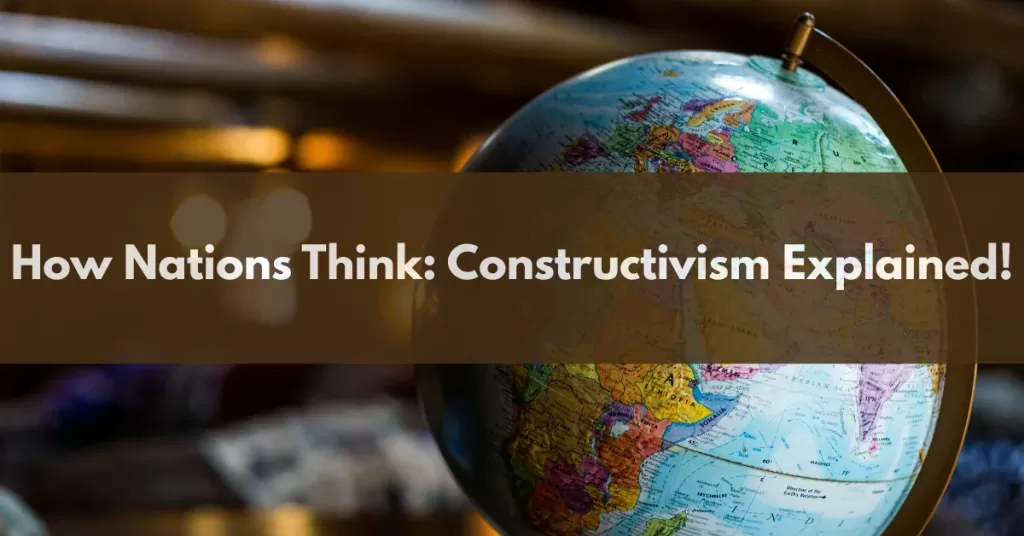Introduction
Imagine you are in a room with people from different cultures. You notice how their beliefs, traditions, and social backgrounds influence their actions. Some might greet you with a handshake, while others bow or simply nod.
Why do these differences exist? Because our identities and social norms shape how we interact. Now, apply this idea to global politics. Countries, like people, are influenced by their identities, social values, and shared beliefs. This is where constructivism in International Relations comes into play.
Unlike traditional theories like realism, which focus on military power, or liberalism, which emphasizes institutions, constructivism suggests that the way states behave depends on shared ideas, identities, and social norms. If you’ve ever wondered why some countries become allies despite historical conflicts, or why some remain rivals despite economic benefits of cooperation, constructivism provides the answers.
What is Constructivism in International Relations?
Constructivism in International Relations is a theory that argues that international politics is socially constructed rather than determined by material factors like military power or economic strength. This means that the way states interact is based on ideas, identities, and social norms, rather than just brute force or financial interests.
Constructivism challenges the assumption that states act only out of self-interest. Instead, it highlights how beliefs, historical narratives, and social interactions shape foreign policy decisions. The central idea is that reality in global politics is not fixed but constructed through human perception and communication.
Key Principles of Constructivism
- Ideas Matter: International politics is shaped by beliefs, ideologies, and social norms rather than just power and resources.
- Identity Shapes Actions: A state’s identity, formed through history and culture, influences how it perceives threats and opportunities.
- Social Interaction is Key: Nations develop their policies based on interactions with others, just as individuals shape their behavior through social experiences.
- Anarchy is What States Make of It: Unlike realists who argue that anarchy forces states to compete, constructivists say that states define what anarchy means through their interactions and perceptions.
- Norms and Rules Evolve Over Time: International norms, such as human rights or environmental protection, are not fixed; they change as global society evolves.
How Constructivism Differs from Other Theories
To understand constructivism in International Relations, let’s compare it with other major theories:
| Theory | Key Focus | How It Sees International Relations |
|---|---|---|
| Realism | Power & Security | States compete for survival in an anarchic world. |
| Liberalism | Cooperation & Institutions | States can cooperate through international organizations. |
| Constructivism | Ideas, Identity & Social Norms | International politics is shaped by beliefs and interactions. |
Unlike realism and liberalism, which see global politics as a system of fixed rules, constructivism argues that politics is dynamic and changes based on shared ideas.
Case Studies: Constructivism in Action
1. The End of the Cold War
The Cold War was not just a military or economic rivalry; it was a battle of ideologies—capitalism vs. communism. When Soviet leader Mikhail Gorbachev introduced reforms like glasnost (openness) and perestroika (restructuring), he shifted the Soviet Union’s identity. The result? The Cold War ended without direct military conflict, proving that ideas and identity shifts can shape international politics.
2. Germany and Japan: From Enemies to Allies
Germany and Japan were aggressive militaristic states during World War II. However, after the war, both nations redefined their national identity as peaceful democracies. Today, they are among the strongest allies of the West, showing how constructivism explains changes in international relationships.
3. The European Union: A Constructivist Success?
The European Union (EU) was built on the idea of shared European identity. Countries that once fought brutal wars now cooperate because they believe in a common future. This demonstrates that shared ideas and values can override past conflicts.
Why Constructivism Matters in Today’s World
Understanding constructivism in International Relations is crucial in today’s global landscape, where political dynamics constantly shift. Here’s why:
- Explains Changing Alliances: Why did the U.S. and China have friendly ties in the 1970s but are now strategic rivals? Constructivism shows that shifting identities and perceptions influence alliances.
- Helps Understand Diplomacy: Why do some leaders use soft power while others rely on military strength? Social interactions and national identities play a role.
- Sheds Light on Global Conflicts: Why do some ethnic conflicts persist despite economic benefits of peace? Constructivism explains that deeply ingrained identities and historical narratives influence actions.
Criticism of Constructivism
Despite its strengths, constructivism faces criticism:
- Too Idealistic? Critics argue that constructivism focuses too much on ideas and ignores hard power (military and economic factors).
- Difficult to Measure? Unlike realism, which can count military forces, constructivism deals with abstract concepts like identity and perception, making it harder to quantify.
- Slow to Explain Change? Some say constructivism struggles to explain sudden political shifts, such as war or economic collapse.
Conclusion
At its core, constructivism in International Relations teaches us that global politics is not just about power and money. It is about ideas, beliefs, and identity. Countries act based on how they see themselves and how they interpret others.
As a student of political science, understanding constructivism helps you think critically about world affairs. It allows you to see beyond military alliances and trade agreements, understanding the deeper social and ideological factors at play.
So, the next time you hear about a diplomatic crisis or a new international partnership, ask yourself: Is this about power, or is it about perception?
Frequently Asked Questions (FAQs)
1. What is constructivism in International Relations?
Constructivism is a theory that argues that international politics is shaped by ideas, identity, and social norms rather than just material power.
2. How does constructivism differ from realism and liberalism?
Realism focuses on power and survival, liberalism emphasizes cooperation, while constructivism highlights the role of beliefs, identity, and interactions.
3. Can constructivism explain global conflicts?
Yes, constructivism explains why conflicts occur due to identity clashes, historical narratives, and differing perceptions of threats.
4. Why is constructivism important in modern politics?
It helps us understand shifting alliances, diplomatic strategies, and why some nations cooperate while others remain rivals.
5. Is constructivism an idealistic approach?
Some critics argue that constructivism focuses too much on ideas and not enough on hard power, but it remains a crucial tool for analyzing global relations.
References
- Wendt, A. (1992). “Anarchy is what states make of it: The social construction of power politics.” International Organization, 46(2), 391-425.
- Finnemore, M., & Sikkink, K. (1998). “International norm dynamics and political change.” International Organization, 52(4), 887-917.
- Checkel, J. T. (1999). “Social construction and integration.” Journal of European Public Policy, 6(4), 545-560.
- Hopf, T. (1998). “The promise of constructivism in international relations theory.” International Security, 23(1), 171-200.
- Adler, E. (1997). “Seizing the middle ground: Constructivism in world politics.” European Journal of International Relations, 3(3), 319-363.

